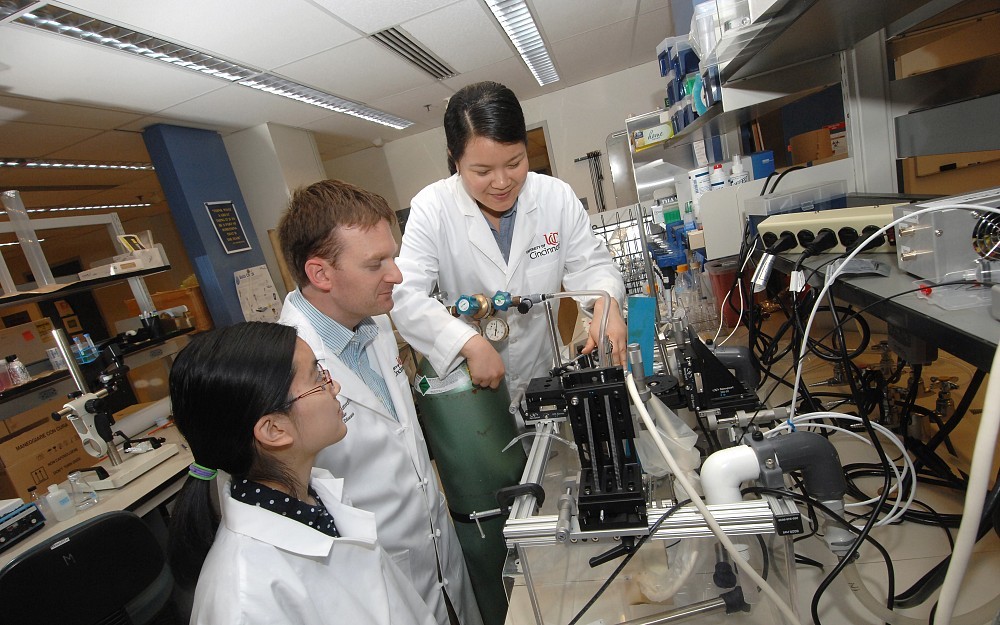
UC Hosts 6th Annual Internal Medicine Research Symposium
The Department of Internal Medicine is hosting its 6th annual symposium Friday and Saturday, June 9-10, 2017, in CARE/Crawley Atrium and at Kingsgate Marriott. The event is titled "Finding the Right Patient: Precision Research.
"The research symposium is one of the venues provided on an annual basis to assist internal medicine in creating an environment that encourages, stimulates and promotes research and researchers, says Carl Fichtenbaum, MD, associate chair for translational research in the department and professor of infectious diseases.
"This two-day event will bring together researchers and trainees from our Academic Health Center and the larger research community at the University of Cincinnati, explains Fichtenbaum, also a UC Health physician. "The symposium presents an opportunity for our researchers and trainees to share ideas and challenges across our divisions and to form new collaborations.
The Department of Internal Medicine comprises nine divisions with more than 280 faculty as clinicians, scientists and investigators. It is the largest unit of full-time geographic faculty in the College of Medicine and is responsible for $75 million in research funding including $12.8 million in new awards during the 2016-17 academic year.
The symposium is free and open to healthcare professionals and researchers. A complete list of activities is available online.
The symposium keynote for Saturday, June 10, will be given in Kingsgate Marriott by Steven R. Houser, PhD, president of the American Heart Association, and professor and senior associate dean at Temple University. Housers topic, "The Future of Precision Medicine: Cardiac Repair and Injury.
"Our faculty have developed expertise that has helped advance our understanding of a diverse array of topics ranging from combating migraine to reviewing the usage of statins on heart patients to the treatment of pancreatic, brain and blood cancers to name a just a few areas of impact, says Gregory Rouan, MD, Gordon and Helen Hughes Taylor Professor and Chair of Internal Medicine and UC Health physician. "The research symposium plays an important role in supporting internal medicines tripartite mission of excellence in education, research and patient care.
Symposium panels will discuss a range of topics including new approaches to regulation of cell function to novel roles of the microbiome in health disease. Researchers will hear about "triumphs and tribulations in clinical trials along with session on bench-to-bedside translational research.
William Ball, MD, Senior Vice President of Health Affairs and Dean of the College of Medicine will offer a welcome at the event and remarks will be presented by Manoocher Soleimani, MD, James F. Heady Professor of Medicine and associate chair for research, and Sakthivel Sadayappan, PhD, professor, Division of Cardiovascular Health and Disease.
Richard Becker, MD, director and physician-in-chief of the UC Heart, Lung and Vascular Institute, says Housers discussion of precision medicine at the symposium is building upon an initiative that former President Barack Obama supported with an additional $216 million in funding to the National Institutes of Health.
According to the National Institutes of Health (NIH), precision medicine is "an emerging approach for disease treatment and prevention that takes into account individual variability in genes, environment, and lifestyle for each person." This approach will allow doctors and researchers to predict more accurately, which treatment and prevention strategies for a particular disease will work in which groups of people. It is in contrast to a "one-size-fits-all" approach, in which disease treatment and prevention strategies are developed for the average person, with less consideration for the differences between individuals.
Becker, also the Mabel Stearns Stonehill Endowed Chair and Professor in the UC Division of Cardiovascular Health and Disease, says UC is honored to have Houser at the research symposium.
"Accepting our invitation to offer this years keynote address speaks loudly to the quality of cardiovascular disease research being conducted on our campus, says Becker, also a UC Health cardiologist. "The level of excitement among our students, post-doctoral fellows and faculty is palpable. We see this recognition and the level of engagement with national and international leaders in the field as being the shape of things to come in our scholarly pursuits.
For more information about the Internal Medicine Research Symposium please contact Yolanda Wess, research manager, Academic Research Services, at 513-558-5131.

Michael Tranter, PhD, assistant professor in the Division of Cardiovascular Health and Disease, center, is working with Sarah Anthony, a research assistant. In the background is Sam Slone, a PhD student in the Department of Pharamcology.
Related Stories
Diabetes, heart problems and kidney disease are closely linked
May 20, 2024
The University of Cincinnati's Estrelita Dixon was featured in a New York Times article discussing ways to manage heart disease, diabetes and kidney disease, chronic diseases which are often linked.
Can new rules in Ohio address a pharmacy staffing shortage and...
May 17, 2024
The University of Cincinnati's Michael Hegener joined WVXU's Cincinnati Edition to discuss recent rules released by the Ohio Board of Pharmacy designed to address pharmacy staffing.
Is ketamine the answer to treatment-resistant depression?
May 16, 2024
The University of Cincinnati's Stephen Rush joined WVXU's Cincinnati Edition to discuss the use of ketamine and esketamine to treat treatment-resistant depression.
